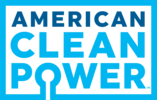News Release from American Clean Power Association (ACP)
Wind Industry Profile of
AWEA: Wind turbine technology played key role in wind energy’s record-breaking growth and cost decline
Washington, D.C., - Over the past five years, U.S. wind energy capacity grew from 25,000 megawatts (MW) to over 61,000 MW, a 140 percent growth rate, yet electricity generated from these wind turbines grew at a rate of 200 percent, exceeding capacity growth and making wind energy cheaper than ever.
The increasing performance and production of wind turbines is the result of technological innovation and operational improvements, which has effectively driven down the costs and allowed development to occur in lower wind speed regions. Advancements undertaken by manufacturers include designing taller towers and turbines with longer and lighter blades allowing rotor diameters to exceed 100 meters, larger than the wingspan of the largest commercial jets. The power of the wind is directly proportional to the swept area of the blades, so an increase in rotor diameter has spurred development in low and medium wind speed areas and has added to the efficiency of existing sites.
“Wind turbine and component manufacturers have been diligently working over the last few years to develop longer, lighter advanced technology blades that allow the systems to produce more energy at lower costs,” said Steve Lockard, President and CEO of TPI Composites. “Continued reduction in levelized cost of energy (LCOE) is key to making wind even more competitive with conventional electricity sources,” said Lockard.
Tower heights have also grown steadily in the last five years, allowing developers to access higher, steadier wind resources. A decade ago, the average wind turbine was installed on a 65 meter tower. Today, the average wind turbine sits atop an 80 meter tower, but 85 and 100 meter towers are increasingly utilized.
The combination of taller towers and larger rotor diameters has been vital to bringing the cost of wind energy down, allowing developers to build projects in a cost-effective manner in locations like the Great Lakes. States like Indiana, Ohio and Michigan have experienced rapid growth and a decrease in the price of wind power once tower heights reached 80 meters. According to the Michigan Public Service Commission, as electricity production has increased, wind contract prices have fallen from 11 cents to 4-5 cents since 2009.
Operational improvements have also contributed to the increased production. More informed operations and maintenance strategies have led to the highest performance levels ever seen in the U.S. wind industry. According to an assessment by the Sandia National Laboratory, wind turbine availability, utilization and capacity factors have all improved over the past three years. In all, capacity factors have risen across the fleet and at certain projects in wind-rich states capacity factors have exceeded 50 percent, according to the Department of Energy.
In just under two months’ time, the entire wind industry will gather in Las Vegas, Nevada for AWEA WINDPOWER 2014 Conference & Exhibition on May 5-8, to discuss the above mentioned technology improvements and unveil the next fleet of wind turbines that will undoubtedly build on the progress we have seen over the last five years. The wind energy industry started 2014 with a record 12,000 MW of wind project capacity under construction and will deliver even more clean and affordable energy to our nation’s electricity generation portfolio.
Further details on wind energy generation data, state-level wind energy statistics as well as trends in distribution and average turbine size will be released in the forthcoming AWEA U.S. Wind Industry Annual Market Report Year Ending 2013.
The complete AWEA U.S. Wind Industry Annual Market Report Year Ending 2013 will be released in April 2014. This 100-page report will provide a comprehensive look at the U.S. wind energy industry, project activity by state and region, market rankings and key industry players, wind turbine characteristics, status of power offtake and electric utilities, component manufacturing, and impact of the U.S. wind energy industry. Get a glimpse through the table of contents and summary from the 2012 report. Attendees of WINDPOWER 2014 in Las Vegas can attend market sessions at the AWEA booth and hear directly from experts’ market insights, upcoming activity and industry trends.
- Source:
- AWEA
- Email:
- windmail@awea.org
- Link:
- www.awea.org/...

